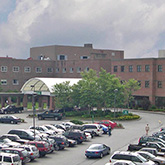Learn about congenital heart disease and treatment options at Central Vermont Medical Center.
Request an Appointment
Request an appointment with a UVM Health Network – Central Vermont Medical Center cardiologist.
Congenital Heart Disease: What You Need to Know
When most people think of heart disease, they associate it with health problems that arise from living an unhealthy lifestyle. This is not the case however, as some people are born with congenital heart disease. When an infant is born with an abnormal heart, it is called a congenital heart defect. This occurs in about eight out of every 1,000 infants born. While some defects are mild and not noticeable during infancy or even in childhood, some are severe and require immediate surgery.
Thanks to the advancements made in technology, cardiac medicine and catheter-based interventional procedures, now over 90 percent of infants born with congenital heart disease are living longer into adulthood. Skilled doctors who specialize in treating adults with this disease, make it possible for them to live a long, full life.
There are several factors linked to the development of congenital heart defects in infants. They include the following:
- If your mother had measles, type 1 or type 2 diabetes while pregnant
- If your mother drank alcohol or took specific drugs like Isotretinoin (taken to treat acne) or lithium (taken to treat bipolar disorder).
- A family history of congenital heart disease or the presence of genetic syndromes like down syndrome.
Congenital Heart Disease Diagnosis:
A heart defect is most often detected as an abnormal sound heard through a stethoscope during a routine exam. Other procedures like a chest x-ray or electrocardiogram can uncover defects as well. The following imaging studies and procedures are then performed by cardiac specialists to diagnose and determine the severity of your condition:
- Echocardiogram – Evaluates the structure and efficiency of the heart. Sound waves generate images of the heart in motion, and uncover patterns, blood flow issues, and the exact location of a congenital heart defect. From there the best treatment option can be determined.
- Electrocardiogram – Also known as an EKG or ECG, this test records the electrical activity of your heart through electrodes that are attached to your skin. This uncovers any abnormalities in heart rhythms.
- Computed Tomography and Magnetic Resonance Imaging (MRI) – Through the use of x-ray radiation and magnetic resonance, doctors can take a closer look at the structure of the heart and how it functions. Images can be taken of other areas within the chest cavity as well, to see if the congenital defect is impacting organs or other blood vessels.
- Cardiac Catheterization – This procedure allows doctors to make take pressure and blood flow measurements by inserting catheters inside the heart. A dye can also be injected into the heart’s arteries, highlighting any narrowed or blocked arteries that are causing issues. The information gathered from these tests is then used to determine the best form of action for treating your congenital heart defect.
Congenital Heart Disease Treatment:
When you choose a university hospital and health system for your care, you can expect a team of devoted and experienced cardiac specialists to recommend a treatment plan that is best suited for your specific needs. Whether you have a minor congenital heart defect that simply needs routine monitoring, or a more serious condition that could lead to complication, our facility offers a full range of treatments. You’ll be prescribed specialized medications, and feel confident knowing you’ll be working with doctors who focus on congenital heart disease.
Our UVM Health Network team includes general cardiologists, interventional cardiologists and cardiac surgeons. You can even work with cardiologists who are dedicated specifically to the care of adult patients with congenital heart disease.
Treatment options for congenital heart disease involve non-surgical and surgical/catheter-based treatments.
Non-Surgical Treatment Options:
- Observation – A cardiologist will routinely check in to monitor any minor defects through a physical exam, echocardiogram, and other routine procedures
- Medication – Prescribed to relieve any of the symptoms caused by a heart defect
Surgical and Catheter-Based Treatments:
- Catheter-Based Closure* – There are varying types of congenital heart disease in adults that will require a catheter-based closure. During this procedure, an interventional cardiologist with insert a catheter into a blood vessel to guide to towards the heart. Through the guidance of an x-ray and ultrasound, a metal and fabric device is inserted to close the hole. After time, heart tissue will then seal off the defect by growing around the implanted device.
- Open-Heart Surgery* – For more severe congenital heart defects, open-heart surgery is required. With a highly trained surgical team on hand that specializes in this area and performs these procedures on a regular basis, you can feel confident knowing you’ve chosen the right place to receive treatment.
*Indicates specialists and treatment only available at the Network level.
Congenital Heart Disease Diagnosis and Treatment
At The UVM Health Network, physicians who specialize in congenital heart disease will assess your condition and make a diagnosis.
To make an appointment with one of our specialists, please call 802-225-5660

CVMC Cardiology
Phone
Fax
802-229-9533
Hours
Monday:Phone Hours:
8:30 pm - 12:00 pm
1:00 pm - 5:00 pm

